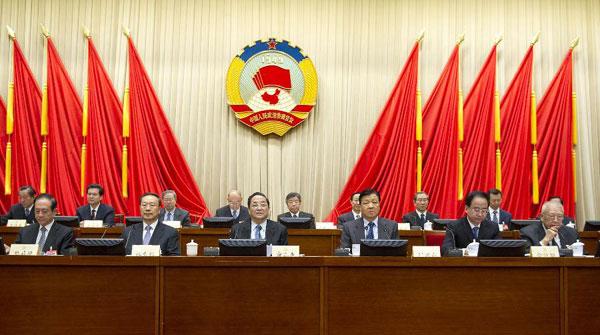The underwhelming communique released soon after the Third Plenum raised big questions about whether China's leadership had been able to get backing for a meaningful package of reforms. On the basis of the more detailed blueprint published several days later, the answer seems a clear yes. Questions will remain over implementation, but this is probably the most impressive statement of reform intentions seen this century.
Unlike the Plenum communique, the Decisions of the Central Committee on Major Issues Concerning Comprehensively Deepening Reforms released three days later, is clear, wide-ranging, and does not shy away from areas of contention.
 |
|
Yu Zhengsheng (3rd L, front), member of the Standing Committee of the Political Bureau of the Communist Party of China (CPC) Central Committee and chairman of the National Committee of Chinese People's Political Consultative Conference (CPPCC), and Liu Yunshan (3rd R, front), also member of the Standing Committee of the Political Bureau of the CPC Central Committee and secretary of the Secretariat of the CPC Central Committee, attend the third session of the Standing Committee of the 12th National Committee of CPPCC, in Beijing, capital of China, Nov. 18, 2013. [Photo/Xinhua] |
The main document is over 21,000 characters long, ranging across the whole spectrum of economic issues. The central emphasis in the Plenum communique was on granting markets a "decisive" role in the allocation of resources, which could in principle mean a great deal, or very little. The full Decisions document suggests that this could shape up to be a significant shift.
To create a more competitive environment, prices will be more market-determined. A "negative list" approach will be adopted to open up more of the economy to private and foreign firms. There is also a pledge that policymakers will step back from micro-level intervention. Within the financial sector, interest rate and capital account liberalization will continue, while private banks will be allowed for the first time. These steps should significantly improve the ability of private firms to compete with State-owned enterprises.
Fiscal reform is another key area. There is talk of increasing the transparency of the budget, shifting some responsibility for spending from local to central government; monitoring central and local government debt situations more closely, and tax reform. These moves should help rein in risks that have certainly been growing.